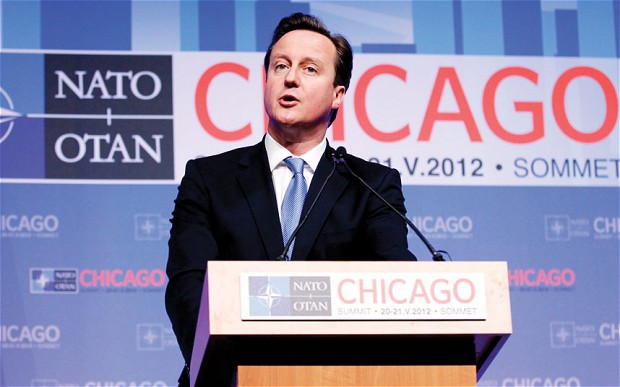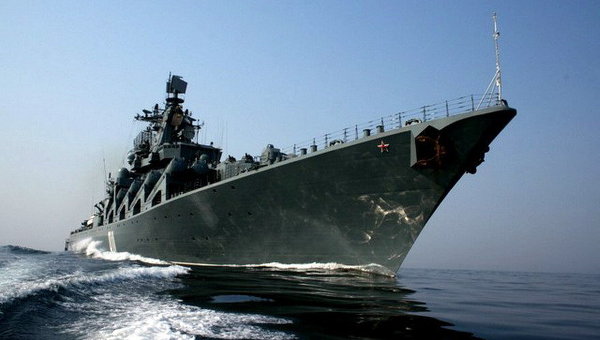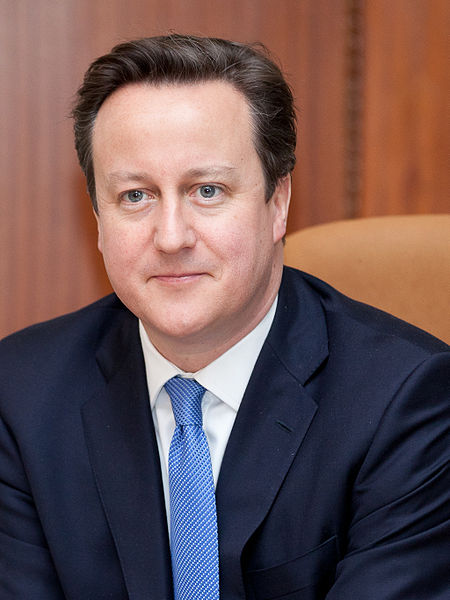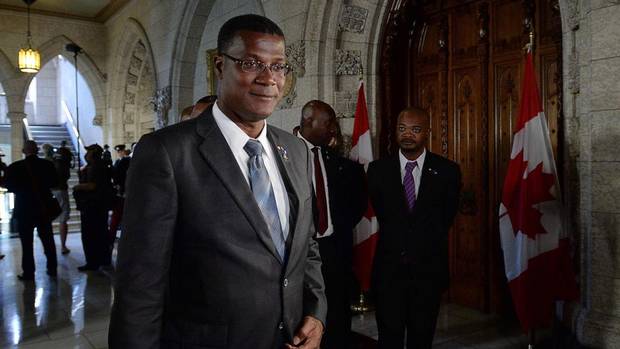[captionpix align=”left” theme=”elegant” width=”320″ imgsrc=” http://i.telegraph.co.uk/multimedia/archive/02226/David-Cameron_2226179i.jpg ” captiontext=” British Prime Minister David Cameron at the 2012 NATO Summit in Chicago.”]
The British Prime Minister was confident and in control at the press briefing he gave on Monday at the conclusion of the NATO 2012 Summit in Chicago. The main focus of the press conference was Afghanistan, but the PM talked about the future of the Alliance as well.
Cameron firmly stated that the UK will withdraw all combat troops from Afghanistan by December 2014. “That is our deadline. At this Summit NATO confirmed that it will be the deadline for the ISAF mission,” said Cameron. “The plan for the transition of full security and responsibility from ISAF mission to Afghan National Security Forces, agreed in Lisbon, is on track and on time.”
He outlined the withdrawal plan, explaining that by mid-2013 Afghan National Security Forces will be in charge of security across the whole country, with ISAF troops in a supporting role. “But I think it’s very important that we don’t mislead people in any way, because while we’re assisting and helping mode, there will still be occasions where we are in a combat mode before the end of 2014,” emphasized Cameron. However, he said he was confident that the Afghan National Army will do a great job, because they are at the proper level of capabilities and will have some more time to improve further, “so there is no let-up in terms of the military pressure on the Taliban.” This came in response to a question about the Afghan mission being incomplete with the potential for the situation in the country to unravel as soon as ISAF leaves. The PM pointed out that the Taliban have been defeated everywhere they have appeared on the battlefield. “The truth is this: the level of attacks, the level of insurgency has declined compared with last year; I believe it will go on declining. What is absolutely in our control is the growth of the Afghan National Security Forces, the capability that they have, but clearly there will be a better outcome in Afghanistan, if that is accompanied by political development and the political solution as well. That is not really in our control, but I am confident that our troops can leave with their heads held high having completed the combat task in 2014, because they will be handing over to fully capable Afghan National Security Forces, who will be able to deal with any residual problems and issues in a fully capable way,” Cameron concluded.
The PM then went on outlining specifically what Britain has agreed to undertake as part of the reconstruction mission for post-2014, first stressing that NATO will not establish a new combat mission in Afghanistan. He said the aim was to maintain the commitment to a stable Afghanistan by training, advising, and assisting Afghan National Security Forces post-2014. “We’re making a decisive and enduring commitment to the long-term future of Afghanistan. The message to the Afghan people is that we will not desert them. And the message to the insurgency is equally clear: you can’t win on the battlefield; you should stop fighting and start talking.”
The United Kingdom pledged GBP70 million (USD100million) a year starting in 2015. This is one of the largest amounts promised at this Summit, but not as large as Canada, which pledged USD110 million per year. Cameron said that he realized it was a significant contribution, but it is a fraction of the cost of a combat mission, and it is very much in the British national interest to continue to play an active role in supporting Afghanistan post 2014. “This is a vital task, which is about stability and security in Afghanistan, but it is also about stability, security, and freedom from terrorism in our own country and keeping our country safe.”
Cameron said that in addition to the money, Britain will also provide 75% of the trainers at the new Afghan National Army Officer Academy. He said that it was a specific request of President Karzai to the British, and added that he personally believed that it was something where the UK could make a real and lasting contribution to the military effectiveness of the Afghan National Army.
On the topic of the crucial importance of Pakistan in stabilizing Afghanistan, Cameron expressed his conviction that Pakistan was vital for NATO. He conceded that the strained relations and Pakistan’s refusal to let ISAF use its territory was frustrating, but it was important to understand the Pakistani government’s and people’s motivations. “We have to understand the difficult politics and political situation in Pakistan, we have to understand the enormous amount that they have lost to terrorism – probably the country that has suffered more than any other.” He underlined Britain’s deep relationship with Pakistan and the numerous historic, economic, and socio-cultural ties between the two countries, stating his belief that this relationship would contribute to thawing of the present tensions between NATO and Pakistan. “But clearly it is not going to happen today. We need to carry on those discussions and make sure it does happen in the future. I’m confident it will,” he added.
Interestingly, a recurring theme at this Summit was the role of non-ISAF countries in Afghanistan. Both David Cameron and NATO Secretary General Anders Fogh Rasmussen at his own press conference the day before stated that stabilizing Afghanistan was not only the job of ISAF, but a responsibility of the entire international community. Rasmussen said that the projected amount was USD4 billion a year for post-2014 Afghanistan, and although the bulk of the contributions were coming from NATO, other countries needed to participate as well. David Cameron said: “I believe this Summit marks a turning point in these contributions, with almost a billion dollars being pledged to support the Afghan National Security Forces, including new contributions from Australia, Denmark, Germany, Italy, the Netherlands, Estonia – to mention just a few.” He also hoped that more support to Afghanistan’s economic development would be announced at the Tokyo Conference in July.
Finally, the Prime Minister turned to the question of the future of the Alliance. With defense budgets in decline, some have suggested that NATO should lower its ambitions and look inward to the core responsibilities of collective defense. But Cameron said that he argued, and this Summit agreed, that NATO should actually do the opposite: “we should look outwards, reassert NATO’s relevance, and make sure it’s ready and capable to tackle the threats that may lie outside its territory, but nonetheless are very real threats to us at home.” In order to do that, NATO needs a new mindset. It needs to modernize and prioritize better to address the new risks of an unstable world: the failed states, regional conflicts, global terrorism, nuclear proliferation and cyber-attacks. To be successful in this endeavor, it is important for the allies to cooperate, share lessons learned and specialize. Cameron cited the example of the Baltic States – who are fighting in Afghanistan while their airspace is protected by other NATO members – as an arrangement that needs to be emulated. According to Cameron, this approach lies at the heart of the NATO Forces 2020 Defense Package, agreed at this Summit.
Overall, this was a successful Summit for David Cameron, who achieved all the main objectives he had set out. The PM concluded his press conference with the following: “NATO binds the US to Europe not as a security provider, but a security partner. It is the bedrock of our defense, it’s vital to Britain’s national security, and the decisions we made today, I believe, will ensure that remains the case.”




